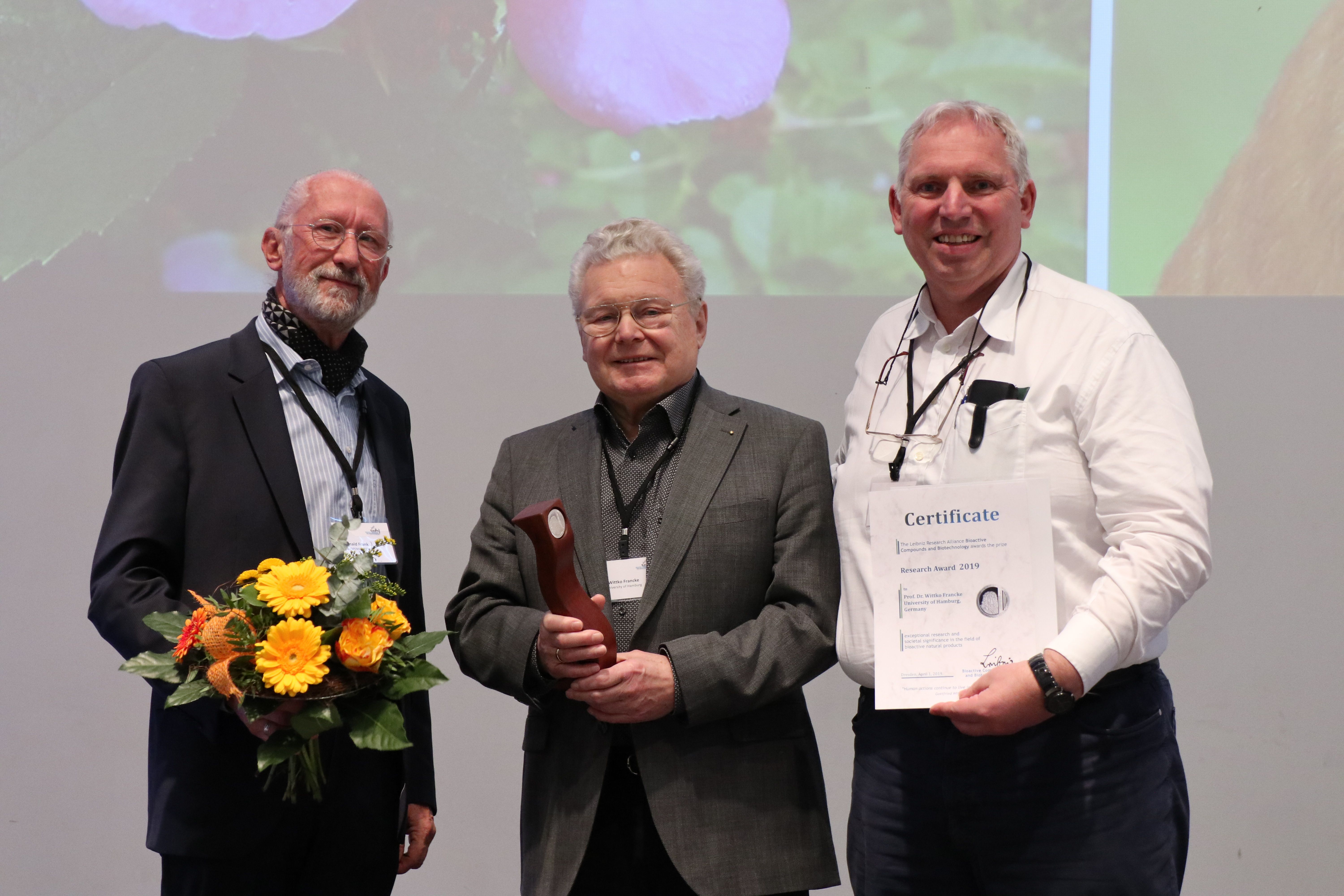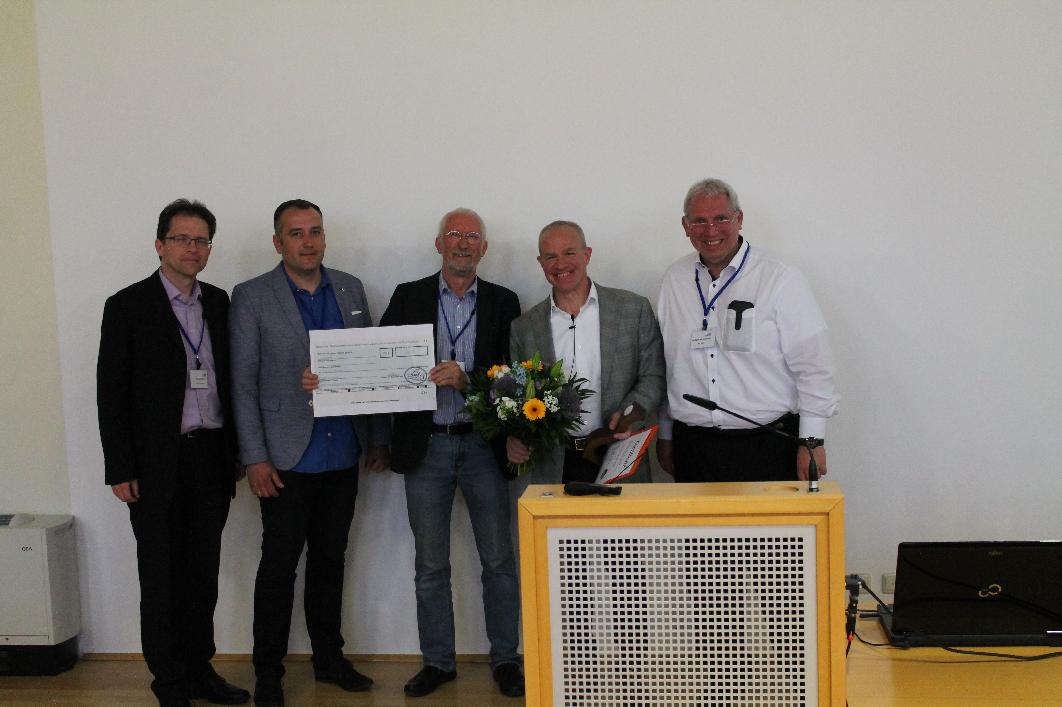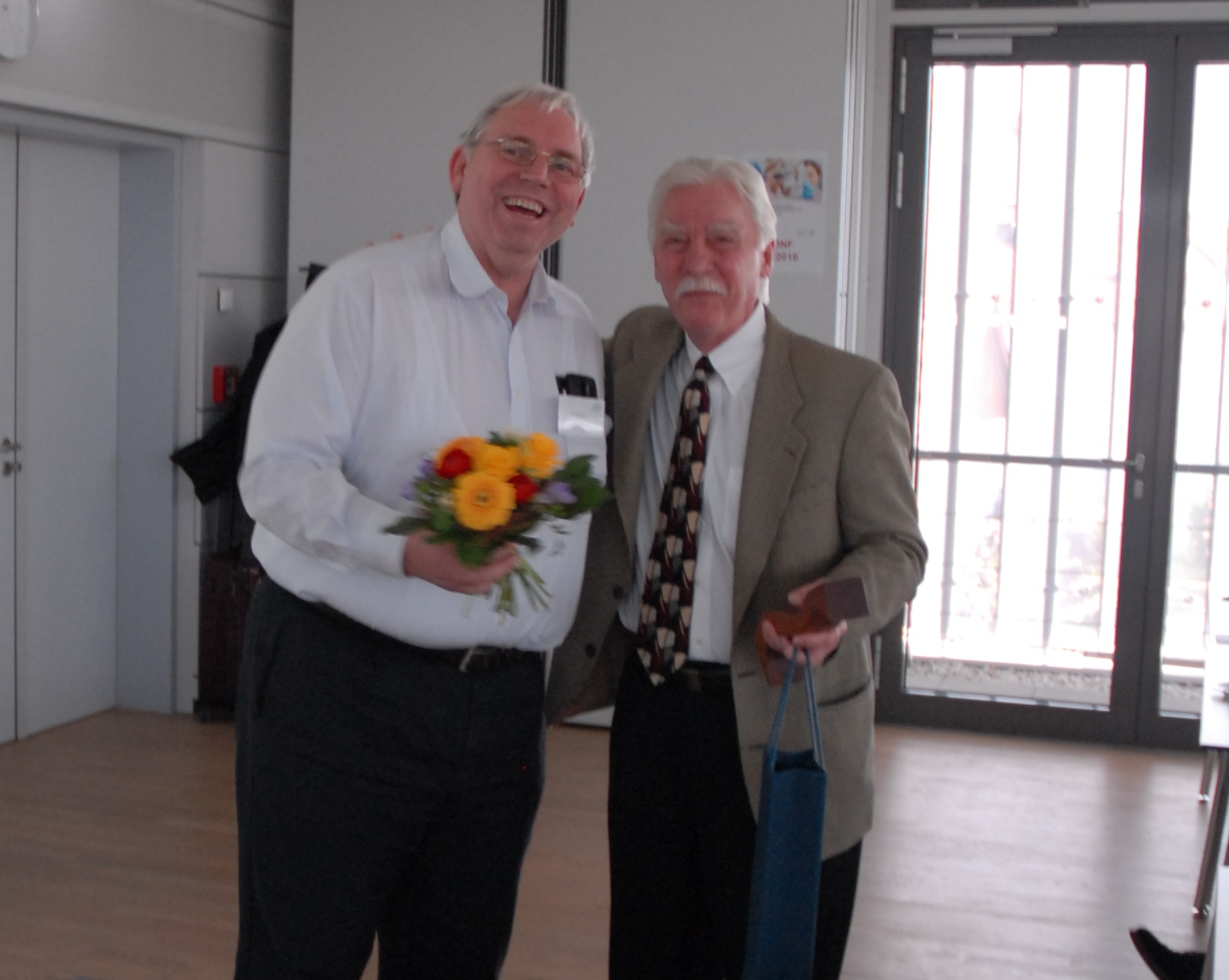Research Award of the Leibniz Research Network Bioactive Compounds
2024
Leibniz Research Award to honor Prof. Jan Krönke
This year´s prize was awarded to Professor Krönke from the Department of Hematology, Oncology and Tumorimmunology, Charité Universitätsmedizin Berlin. He is one of the pioneers of PROTAC research, which is now experiencing an indescribable boom.
In particular, he has played a leading role in clarifying the role of thalidomide and ubiquitin ligases and in blood cancer in general, which often cannot be targeted by the usual mitosis inhibitors. He is one of the few physicians with active drug research.
https://haema-cbf.charite.de/forschung/wissenschaftliche_arbeitsgruppen/kroenke_group/
2023
Leibniz Research Award honors Prof. Mohammad Seyedsayamdost
This year´s prize was awarded to Professor Seyedsayamdost, a key leading figure in the field of bioactive natural products. His research interests span from the isolation of novel bioactive natural products using cutting edge analytical methods via the activation of silent biosynthetic gene clusters to in-depth biosynthetic as well as ecological studies. In addition, he is an authority in the field of mechanistic enzymology, particularly regarding radical SAM-based biocatalysts.
During his doctoral studies in the lab of JoAnne Stubbe he applied methods for site-specific incorporation of unnatural amino acids with rapid kinetic and spectroscopic techniques to probe the mechanism of ribonucleotide reductase, an essential metalloenzyme in all living cells. These studies revealed an unprecedented pathway and mechanism for long-range proton-coupled electron transfer catalyzed by transient amino acid radicals. He then joined the labs of Prof. Jon Clardy and Prof. Roberto Kolter as a Novartis LSRF postdoctoral fellow at Harvard Medical School, where he examined the roles of small molecules in mediating microbial interspecies interactions. This work led to the discovery of a novel family of phytotoxins as well as to new approaches for prospecting for bioactive small molecules. His pioneering work on the identification of roseobacticides produced by bacterial symbionts of the microalga Emiliania huxleyi was key in understanding the complex interaction between eukaryotic marine organisms and their prokaryotic partners. In 2013, Professor Seyedsayamdost was appointed as an assistant professor at Princeton University holding a prestigious K99 NIH grant. He quickly rose through the ranks and he is currently a full professor at Princeton University.
Professor Seyedsayamdost is the recipient of various awards including the Searle Scholars Award, the Pew Biomedical Scholars Awards, and co-recipient of the Princeton Environmental Institute’s Innovative Research Award. He has received the Princeton Intellectual Property Accelerator Award, the NIH Director’s New Innovator Award, the Burroughs Wellcome (PATH) Investigator Award, the Camille Dreyfus Teacher-Scholar Award, the American Chemical Society’s Pfizer Award in Enzyme Chemistry, as well as the NSF CAREER Award. More recently, he was selected a Natural Product Reports Emerging Investigator, a Protein Science Young Investigator, and a MacArthur Fellow.
Year 2020´s awardee: Professor Dr. Rolf Müller
Prof. Dr. Rolf Müller, founder and director of the Helmholtz-Institute for Pharmaceutical Research Saarland (HIPS) has been awarded this year. Professor Müller is a worldwide leading scientist in pharmaceutical biotechnology with an outstanding scientific track-record in the discovery of natural anti-infectives. Full details about his scientific career and output here.
Professor Müller’s scientific work focuses in the identification of efficient drugs from microbial sources (mainly soil-living microorganisms like myxobacteria) and their further development to lead compounds for clinical use. His multidisciplinary approach and ground-breaking contribution in natural drug research, from the understanding of pathogenic interactions at molecular level to the design and effective production of new antibiotics via genetic and metabolic engineering of bacteria is well-recognized.
The experience and current activities of Professor Müller and the HIPS are at the core of the scientific mission of the Leibniz Alliance Bioactive and Biotechnology. By recognizing his outstanding contribution to this field in Germany, we open an excellent opportunity to strengthen the visibility of the Alliance and to link it to one of the most renowned pharmaceutical research institutions in Germany. The cooperative and integrative personality of Rolf Müller, together with his extended network within the scientific and industrial communities, can result in a highly positive effect to our Alliance.
2019
Leibniz Research Award honors Prof. Dr. Wittko Francke
The Leibniz Research Award 2019 honors Prof. Dr. Wittko Francke for his groundbreaking achievements in chemical ecology. He discovered a number of bioactives originating from insects, fungi and plants. Beyond the chemical description of complex mixtures such as the pheromone bouquets of insects, he is strongly interested in the bio- and chemical synthesis and the biological activity of the discovered compounds. Results from his work contributed to the development of eco-friendly pest control. His interest was always open to other areas of ecology that can profit from his advanced analytical and synthetic expertise such as monitoring, biotransformation and biodegradation of xenobiotics. Wittko Francke fostered the field of chemical ecology in many ways, as e.g. coordinator of a DFG priority program “Chemical Ecology”, as member of the board of directors of the Max-Planck-Institute for Chemical Ecology in Jena, as president of the International Society of Chemical Ecology (ISCE), as member and chair of the board of Liebig-Vereinigung für Organische Chemie of the GDCh, as chairman of the Young Europeans in Environmental Research Jury. He collaborated with numerous international scientists. He edited several interesting books including the volume on natural products of the RÖMPP series, a chapter on pheromones in the Handbook of Natural Products, and on semiochemicals in the Topics of Current Chemistry; since 1991 he is co-editor of the widely known „Beyer & Walter“ textbook for organic chemistry. Furthermore, he is co-editor of the Journals Chemoecology, Journal of Chemical Ecology, European Journal of Organic Chemistry as well as the Liebigs Annalen.
2018
Leibniz Research Award to honor Prof. Dr. Jay Keasling
The Leibniz Research Award 2018 honors Prof. Dr. Jay Keasling for his groundbreaking achievements in synthetic biology. He is professor of chemical engineering and bioengineering at the University of California, Berkeley. He is also associate laboratory director for biosciences at the Lawrence Berkeley National Laboratory and chief executive officer of the Joint BioEnergy Institute. Prof. Keasling received his bachelor’s degree at the University of Nebraska-Lincoln. He went on to complete his Doctor of Philosophy degree at the University of Michigan in 1991 under the supervision of Bernhard Palsson. Keasling performed post-doctoral research with Arthur Kornberg at Stanford University in 1991-1992.
His research focusses on developing foundational tools for engineering metabolism inside cells and to use those tools to solve important societal problems. A variety of tools have been developed for regulating metabolic pathways inside cells, novel metabolic pathways to produce unnatural molecules, and robust microbial hosts for producing chemicals under a variety of industrial conditions. These tools were used to produce the antimalarial drug artemisinin, a variety of commodity and specialty chemicals, and biofuels.
2017
The LRA Bioactive Compounds and Biotechnology honors the exceptional work of Prof. Dr. Jon Clardy with the Leibniz Research Award
On the Leibniz Conference on Bioactive Compounds 2017, April 10-11, hosted by Deutsche Forschungsanstalt für Lebensmittelchemie (DFA) in Freising, the Alliance proudly handed the Leibniz Research Award to Prof. Dr. Jon Clardy from Harvard Medical School, Boston, USA. With this award they honored his outstanding scientific contributions to the understanding of the biological role of natural compounds – ranging from extraction from uncultured bacteria over structure elucidation to mode-of-action-studies. In a plenary talk during the conference Prof. Clardy gave insight into his research to the highly interested audience.
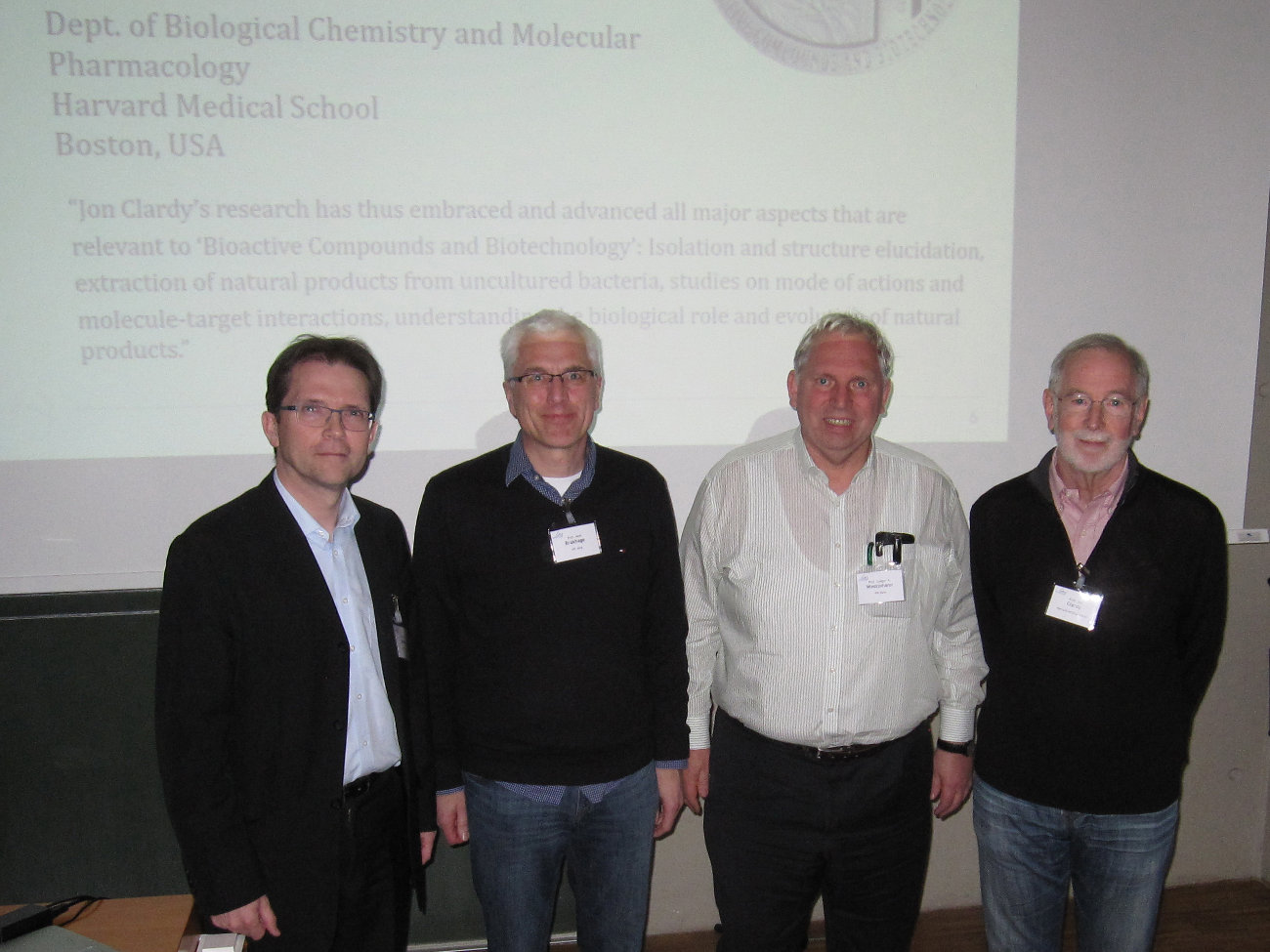
2016
Leibniz Research Award goes to honor
Prof. Dr. Paul A. Wender work
This year for the first time Leibniz Research Alliance Bioactive Compounds and Biotechnology rewarded Leibniz Research Award. The award is granted in recognition of Prof. Dr. Paul A. Wender exceptional research and societal significance in medicine, biology, imaging and materials science at the “Leibniz Wirstofftage 2016 / Leibniz Meeting on Bioactive Compounds 2016” on 25.04.2016. in Jena.
Over the past 40 years, Wender and his coworkers have had a unique and major impact on not only how we make molecules but on which molecules to make, merging major advances in synthesis with goals of exceptional research and societal significance in medicine, biology, imaging and materials science. He and his group have made seminal and impactful contributions to a range of sciences driven by synthesis of complex molecules in medicinal chemistry; real-time imaging; drug delivery with designed molecular and oligomeric transporters, nanotubes and nanoparticles; and chemical biology. Wender’s ability to connect innovative design and syntheses of small, medium and large molecules and molecular assemblies with major unmet medical needs is influencing how we think about making molecules and reaction science; leading to new concepts, tools, and companies for drug delivery; and driving new preclinical leads for the treatment of cancer, HIV/AIDS, Alzheimer’s disease, and in small molecule enhanced immunotherapy.
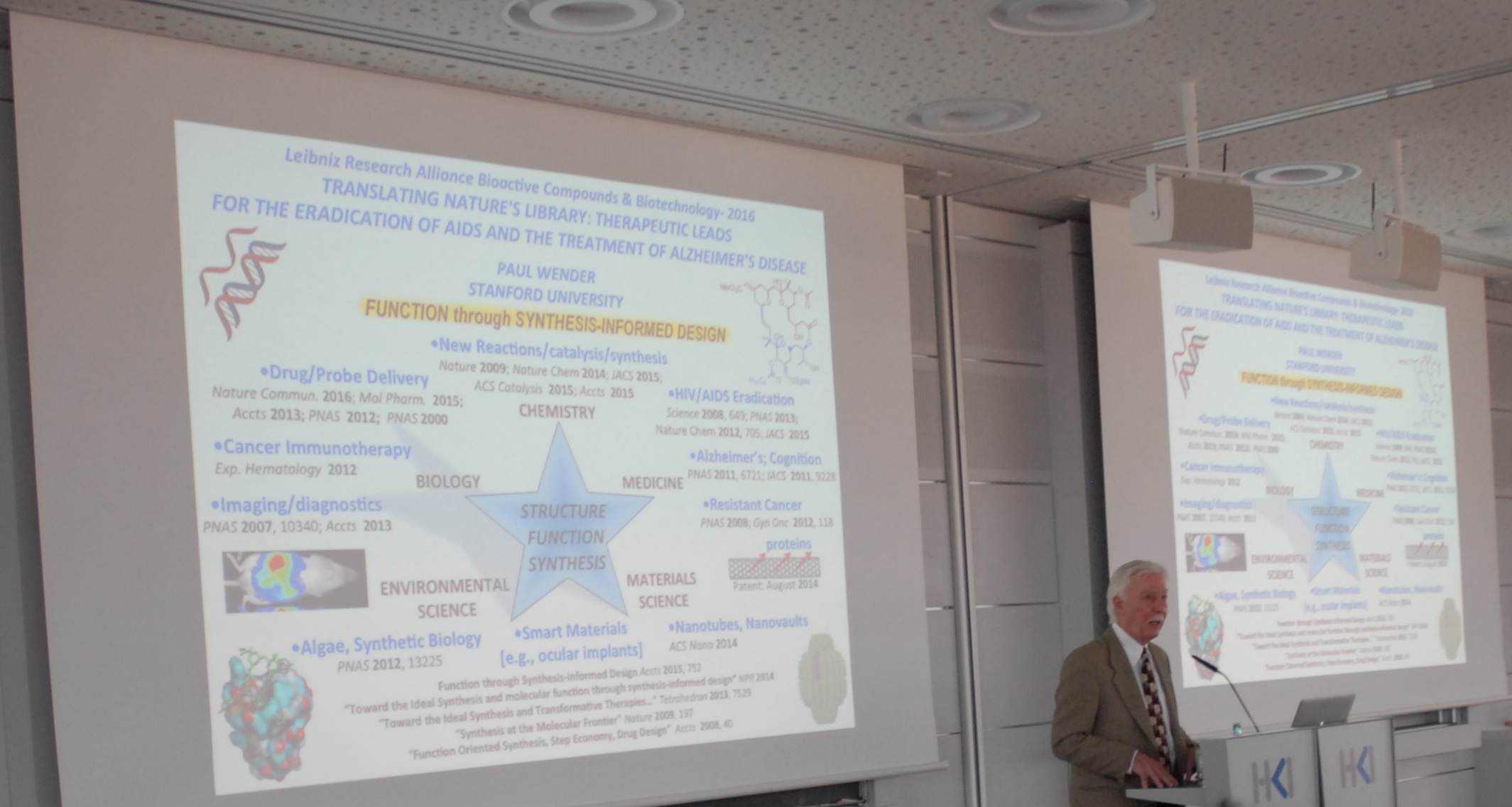
Disclaimer:
Die Preise werden vom Leibniz-Forschungsverbund Wirkstoffe und Biotechnologie ausgegeben, verantwortliche Ansprechperson ist der Koordinator/die Koordinatorin, ersatzweise der/die Sprecher/in des Verbundes. Über die Preisvergabe entscheidet ein vom Verbund bestimmtes Komitee. Bei Nichtannahme oder bei der Preisvergabe widersprechenden Erkenntnissen wird zunächst der nachfolgende Vorschlag berücksichtigt. Das Preisgeld wird an den/die verantwortlichen Seniorwissenschaftler/in der preiswürdigen Erfindung vergeben, ersatzweise an den/die Direktor/in des verantwortlichen Instituts, welche/r über die angemessene und beitragsbezogene Verwendung intern frei entscheidet. Dem/der Koordinator/in ist vom Seniorwissenschaftler/in bis Ende des Preisjahres ein Verwendungsschema mit Überweisungsinformationen zu übermitteln. Die minimale Splittung ist € 100,-. Es besteht kein Rechtsanspruch auf den Erhalt des Preises oder des Preisgeldes. Die Entscheidungen sind nicht anfechtbar, der Rechtsweg ist ausgeschlossen.

